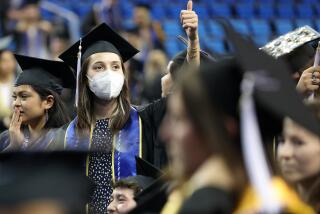16 Test Positive for HIV Virus in AIDS Screening : Health: The low-cost, anonymous tests drew 2,447 participants. The screenings will continue at three sites in the Los Angeles area through the end of the month.
AREA — All but 16 people got a Valentine’s Day present after last month’s mass screening for AIDS.
The overwhelming majority of the 2,447 participants found they were not carrying the HIV virus that causes the deadly disease.
Promoted by a coalition that included AIDS Project Los Angeles, SmithKline Beecham Clinical Laboratories and Century City Hospital, the tests were offered Feb. 8 and 15 at five sites in and around Los Angeles. The tests were anonymous and cost $13.
Lisa Gaines was at the Century City Hospital site, where 1,513 people were tested.
Gaines, who is the hospital’s director of marketing, said the participants were fairly evenly divided between men and women.
“There were a number of women--15 or 20--who came with a husband or significant other and insisted that he be tested because he had been unfaithful,” she said.
The Westside group included about 10 children, one as young as four, brought in by parents. Although the bulk of those tested seemed to be between 25 and 45, about 15% appeared to be 65 or older, Gaines said.
Several of the older participants said they had come not because they feared they might have received a contaminated blood transfusion, but because they said they had been promiscuous.
None of the children or elderly tested positive.
Guaranteed anonymity, participants were not asked to give their names or any other personal information, but some volunteered information about themselves.
Of the 16 people who tested positive areawide, six were women and 10 were men. Two of the men used injectable drugs and two others said they were prostitutes. None of the women appeared to be injectable drug users. Two of the women said they were married. Another said she was engaged.
The group at Century City Hospital included nine people who tested positive, six men and three women. The tests of two others were ambiguous. The two may have recently been exposed to the virus and not yet developed antibodies against it, Gaines said. People with borderline results are counseled to have themselves retested in two months.
There was one other borderline result areawide.
Gaines said individuals who tested positive were given their results in the presence of a physician, a counselor and a social worker. (All participants received counseling by trained individuals both before and after they took the test.)
According to Gaines, two of the three women who tested positive at Century City made virtually the same comment: “Some man gave this to me.”
“One was a 32-year-old hoping to settle down and have children,” Gaines said. The woman, mournful at the prospect of never having a child, said she could think of only one thing she had done that might have exposed her to the virus.
“She had had unprotected sex on New Year’s Eve with a friend of a friend,” Gaines said. “She said she had had too much to drink.”
Gaines said the unlucky minority usually asked: How long will it take? Can I beat it?
The 0.6% positivity rate among those tested areawide was slightly higher than the national average, according to Peter R. Wolfe, a physician who specializes in the treatment of acquired immune deficiency syndrome. He was not surprised. “There’s a certain amount of self-selection,” he said. “If somebody was worried enough to be tested, maybe they had reason to be worried.”
Wolfe, who did some of the early research on anti-AIDS drugs at UCLA, said that being tested was good both for public health and for the individual. Knowing your HIV status can keep you from unwittingly spreading the disease. And it can also lead to early medical treatment for the individual.
Wolfe said the prognosis for AIDS patients is a little less grim than it was previously. Before AZT and other effective treatments were developed, people with AIDS lived an average of 13 to 14 months after diagnosis, he said. Now the average is more than two years.
Wolfe said it is reasonable to hope that a drug will eventually be found that will allow AIDS patients to live long, quality lives.
Gaines said that 227 people, including two who are positive and two who are borderline, did not return to the testing sites to get their results. They can do so by calling (310) 201-6776.
The sponsors have decided to continue to offer low-cost, anonymous testing at three sites in the Los Angeles area through the end of the month.
They are Gabin Medical Group in Los Angeles at (310) 201-0900, Gabin Medical Group in Long Beach at (310) 424-4000 and Bedford Medical in Beverly Hills at (310) 246-6555.
The cost is $13, which must be paid in cash.
More to Read
Sign up for Essential California
The most important California stories and recommendations in your inbox every morning.
You may occasionally receive promotional content from the Los Angeles Times.










